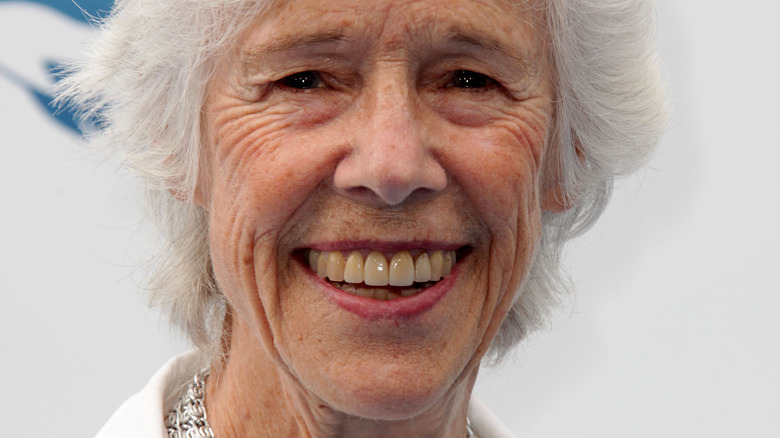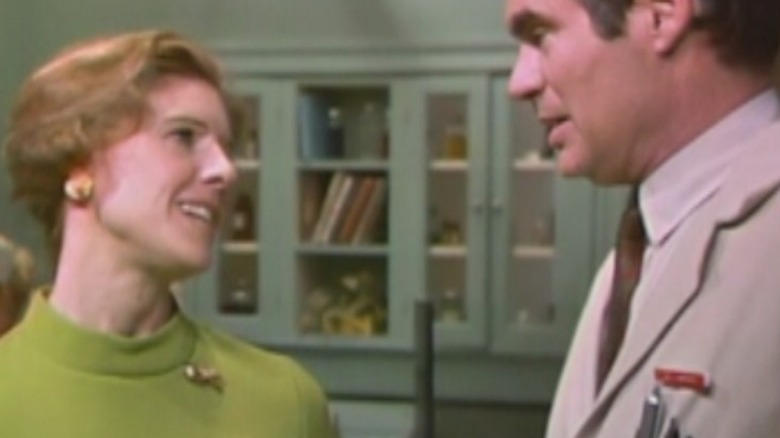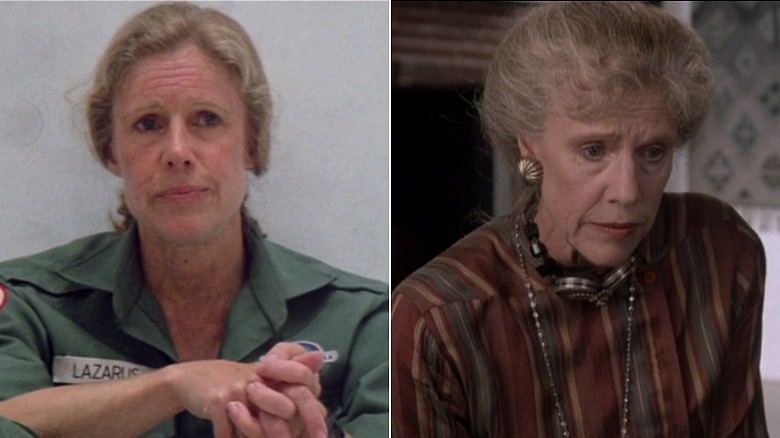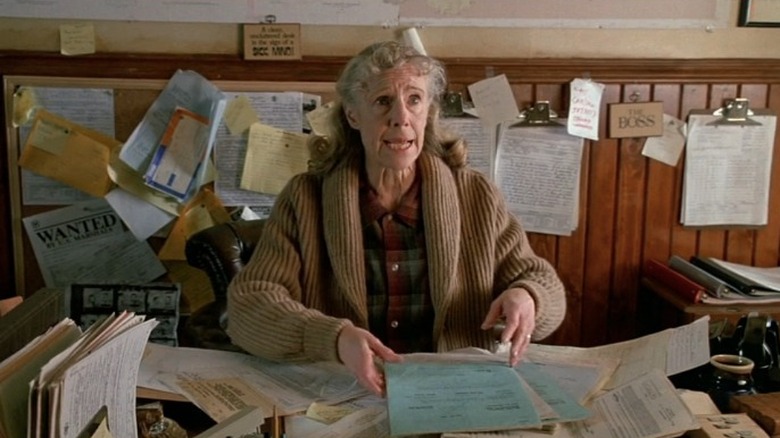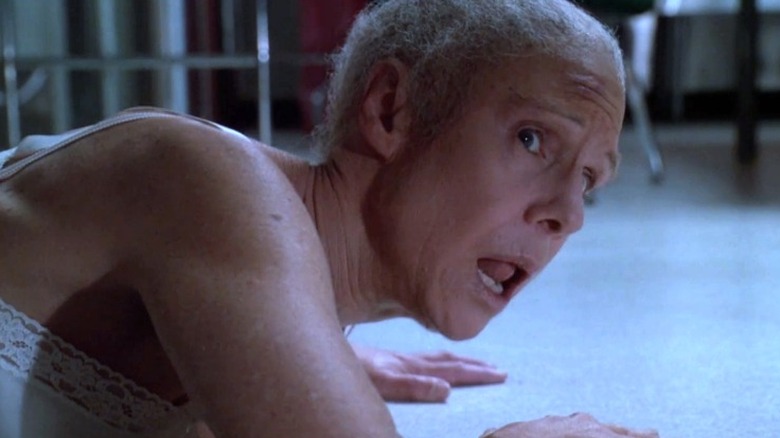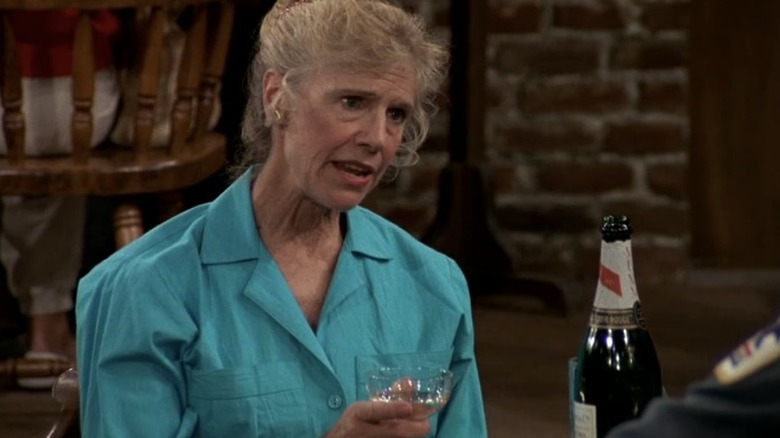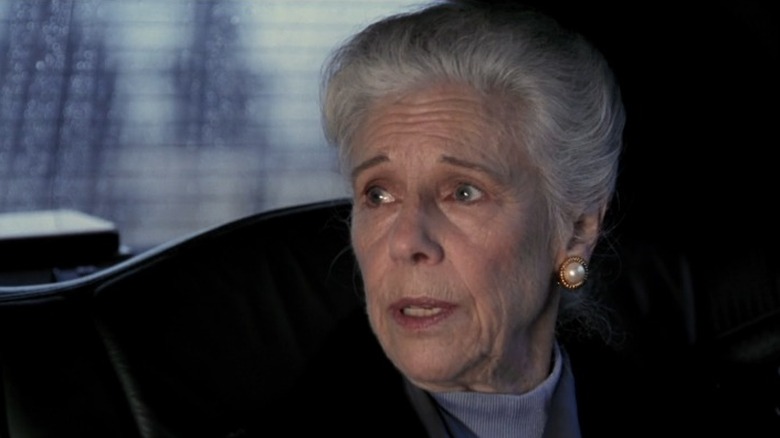Why Sex And The City's Bunny MacDougal Looks So Familiar
For six years — beginning in the boy band and butterfly-clipped days of 1998, and ending in the year of the Motorola Razr — Darren Star's "Sex and the City" was about the most culturally pervasive dramedy on cable television. Star's adaption of Candace Bushnell's best-selling book turned Magnolia Bakery cupcakes and giant cosmos into the hottest thing since (all other) cupcakes and appropriately-sized cosmos, popularized Manolo Blahnik and the Meatpacking District (via Stylecaster), and made owning an apartment in New York, writing for Vogue, and eating exclusively in chic restaurants look like an attainable dream.
However, beneath all the tutu tulle and vodka-flavored cranberry juice, "Sex and the City" also did something few mainstream series had ever attempted: it revolved around four single working women, each of whom embraced, confronted, enjoyed, and openly discussed their relationships with then-unprecedented realism.
Of course, it also carved out these women — with only an occasional wink at self-awareness and irony — out of unrealistically restrictive archetypes. There was the neurotic artist (Sarah Jessica Parker's Carrie), the girl boss (Cynthia Nixon's Miranda), the sexpot (Kim Cattrall's Samantha), and the puritanical pollyanna (Kristin Davis' Charlotte). When Charlotte got engaged to her first Mr. Right (not to be confused with Mr. Big), she ran into an obstacle of equally archetypal proportions: the overbearing mother-in-law.
If Charlotte's nemesis from Seasons 4 and 5 looks familiar, it's because the blue-blooded Bunny MacDougal was portrayed by an actor whose career began well before her guest appearance in Carrie Bradshaw's voiceovers.
Frances Sternhagen starred in a long-running soap
Though the actor behind Bunny, the three-time Emmy nominated Frances Sternhagen, had been a thespian for decades by the time she made the transition to television, her path to becoming a household face began most properly in 1970, when she joined the cast of NBC's long-running daytime soap, "The Doctors." Throughout that year, she starred as the calm, cool and seemingly frigid Phyllis Corrigan in over 40 episodes of the network's predecessor to what would become a primetime craze, the medical drama. The series debuted on the first of April of 1963 — the same day that rival network ABC hit audiences with Doris and Frank Hursley's "General Hospital" (via IMDb).
Though she'd already appeared briefly in a handful of television shows, TV movies, and even a feature film (that being Robert Mulligan's "Up the Down Staircase") "The Doctors" was undoubtedly the star's big mainstream break. What's more, in her time on the series, and as Phyllis, Sternhagen established a character type to which she'd later return: that of the stern and assertive aunt (in this case, to Robert Salvio's Gary Corrigan) who refuses to coddle her nephew, or anyone else for that matter.
Though Sternhagen appeared in a number of popular productions over the course of the next decade (including the aptly titled romcom, "Romantic Comedy"), her film and television career in the 1980s was defined largely by a genre and form that couldn't be less like the daytime soap: the sci-fi movie.
Sternhagen was a sci-fi staple
In Peter Hyams' "Outland" (1981), David Greene's "Prototype" (1983), and Philippe Mora's "Communion" (1989), Frances Sternhagen brought a variety of characters to life. Hyams wrote and directed the Oscar-nominated "Outland," and in the visually innovative spin on the classic western, Sean Connery leads as a federal marshal named O'Niel who's been sent to maintain order at a mining colony on one of Jupiter's moons. Sternhagen stars as Dr. Lazarus, the colony's initially jaded doctor — a character the actor portrays "with bright crotchetiness," as Pamela Kessler of The Washington Post wrote — who serves as O'Niel's only ally and is ultimately won over by his unassailable integrity and belief in people.
In "Prototype," Greene's TV movie, the actor portrays Dorothy Forrester, wife to the film's heartfelt twist on the classic Dr. Frankenstein, Christopher Plummer's Dr. Carl Forrester. Finally, in Mora's "Communion," the future "Sex and the City" guest star appeared alongside the enigmatic Christopher Walken as Dr. Janet Duffy, a psychiatrist who helps Walken's Whitley Strieber confront the memory of his alien abduction using hypnotherapy.
All three sci-fi films explore the nature of what it means to be human — and humanity's place in the universe — not unlike the genre into which Sternhagen would move in the 1990s.
Before Sex and The City, there was . . . Stephen King
In 1990 and 1991, Frances Sternhagen appeared in two Stephen King adaptations — Rob Reiner's Oscar-winning "Misery," and the CBS miniseries, "Golden Years." The fact that "Misery" was one of the most viscerally unsettling films of the decade all but goes without saying, but a major part of what puts the film over-the-top is the placement and pace of its more innocuous small-town elements and characters, including Richard Farnsworth's Sheriff Buster and Sternhagen's Deputy Virginia.
In "Golden Years," Sternhagen played a more central role as Gina Williams. The "Benjamin Button"-esque narrative sees her husband Harlan (Keith Szarabajka) survive an explosion at a covert army lab only to discover he's now aging backward. There are some heartbreaking moments in the series, most of them delivered by Sternhagen, including a scene wherein she breaks down upon realizing that the husband she was once aging alongside is now, in her mind, too young for her. On the surface, "Golden Years" is your average, "wacky government science gone wrong" story, but that synopsis belies the poignant message about our relationship to aging encompassed in both its title and in Harlan and Gina's relationship. As Szarabajka described it, "It's sort of 'Oh, boy, I'm getting younger. Oh, God, I'm getting younger'" (via The New York Times).
In 1991, genre-blending miniseries (a trend kicked off by David Lynch's revolutionary "Twin Peaks") were still an atypical, even experimental choice for network television, but the following year, Sternhagen teamed up with yet another creative known for his innovation and risk-taking: Brian De Palma.
Sternhagen starred In De Palma's nod to Psycho
In "Raising Cain," Paste noted that director Brian De Palma "almost seems to want to make an entire movie based on the infamous 'Psycho' ending, where a doctor arrives to deliver a torrent of exposition about the Psychology of Norman Bates." It's an astute reading of the weird and almost apathetically (if not wholly unintentionally) genre-blending flick, in which John Lithgow portrays Carter, a man with multiple personalities who's running around killing mothers and stealing their babies to conduct scientific experiments on them (via Entertainment Weekly).
In the 1992 film, Frances Sternhagen takes center stage in one of the "Carrie" director's most obvious nods to Hitchcock's seminal, real world-inspired horror flick. She is the exposition delivering doctor (Dr. Waldheim) and over the course of one comedically self-aware and heavy-handed single take, the camera follows her down staircases and in and around elevators as she fills two local cops in on Carter's uniquely traumatic past and the psychology it birthed. All the while, her thick, brown, retro and apparently synthetic bouffant never budges. In a later scene, and in yet another reference to "Psycho," we see the back of "Dr. Waldheim" as she walks out of the station, but it is (of course) Carter, wearing her wig and coat.
Sternhagen may be more immediately remembered for the roles that came after her foray into De Palma land, but she's also, arguably, one of the more memorable elements of "Raising Cain."
Sternhagen has done sci-fi, horror, and sitcom comedy
Before, during, and after her silver screen sci-fi and horror projects, Frances Sternhagen was a recurring character on one of television's most beloved sitcoms: NBC's "Cheers." In Season 5's "Money Dearest" the actor made her Boston bar scene debut as Esther Clavin, the widowed mother of postman Cliff Clavin (John Ratzenberger), to whom he plays matchmaker in an attempt to land himself a wealthy stepfather. The actor would return to the celebrated series for six more episodes, and receive consecutive Emmy nominations in 1991 and 1992 for her portrayal of the abrasive mailman's dry and witty but warmhearted "Ma."
There's a canyon of difference between Sternhagen's practical, "working class Kennedy"-accented Esther Clavin and her absurd, silver spoon-mouthed Bunny MacDougal, and the two work phenomenally well as an illustration of the actor's range — so much so, in fact, that it's tempting to assume she was cast as Bunny because the character stood in such stark contrast to her iconic sitcom mom. But there's another staple Sternhagen character whose mannerisms (and bank account) much more closely resemble her "Sex and the City" monster-in-law, and which could just as easily be at the forefront of casting directors' minds when it came to creating the most formidable and materialistic matriarch they could.
With ER, Sternhagen's career came full circle
Over the course of her prolific career, Frances Sternhagen has played a multitude of different characters, starred in every genre under the sun, and given audiences an endless collection of powerful performances in everything from Michael J. Fox romcoms to poignant TV movies like "The Laramie Project." So when, in 1997, she joined the cast of Michael Crichton's "ER," the fact that her "strong, snobby aunt" character bore some resemblance to the character that kicked-off her career ("The Doctors"' Phyllis Corrigan), it could hardly be called an instance of typecasting. Still, Sternhagen's wealthy aunt and patron of a central protagonist, Millicent Carter, does feel like a bit of a nod to her earliest role, in much the same way her son-obsessed Bunny feels like a hilariously cold-hearted spin on her "ER" character.
Sternhagen starred in 21 episodes of the Emmy-devouring and trend-setting series, and her long-time role as the intrusive, upper crust aunt of Noah Wyle's John Carter was (at the time) undoubtedly her best-known. In some ways, Bunny is a Phyllis-Millicent hybrid taken to the extreme — a point that's neither lost on, nor under-appreciated by, the actor herself: "I must say it's fun to play these snobby older ladies," Sternhagen told the Los Angeles Times in 2002, adding with playful understatement, "I have known women like that, and I can imitate them, I guess."
